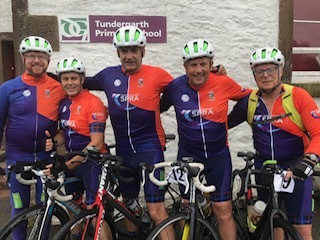A former RAF mountain rescuer has spoken about the “hell on earth” he experienced when he led a search team to look for survivors at the Lockerbie disaster as he prepares to take on a charity challenge.
David “Heavy” Whalley was a senior team leader at the 1988 Lockerbie bombing which killed 270 people. He was involved in leading the search for survivors for the first three days after the tragedy.
Now, to commemorate the 30th anniversary of Britain’s worst terrorist attack, he is taking part in the Cycle to Syracuse event alongside four other men with links to Lockerbie.
They are Colin Dorrance, the youngest policeman on the scene during that night, Paul Rae who volunteered to help search the hills, David Walpole representing the ambulance service and Brian Asher who is now headteacher at Lockerbie Academy.
The five men will cycle nearly 600 miles from Arlington Cemetery in Washington DC to Syracuse University to attend a remembrance event held there to honour the 35 students who were killed during the disaster.
Mr Whalley, who is based in Burghead, is a former team leader at RAF Kinloss and described the moment he was called out to the disaster.
He said: “I was 35 at the time and had already covered about 80 aircraft crashes in my time, however this was like hell on earth.
“I was a team leader at RAF Leuchars and we received a call at 7pm saying that a plane had fallen out of the sky at Lockerbie.
“When I got there there was fire everywhere and it was chaos, the phone lines were down and it was just hellish.
“We couldn’t do much the first night as everyone we could see were dead and by first light there were 150 fatalities and as it was a scene of a crime, we couldn’t move anyone so the casualties were out in the open for so long.
“I had seen most things in my career up to that point, lots of fatalities but this was worse, it was like seeing a town like Elgin with a plane crashed into the middle of it.”
Despite the disaster, Mr Whalley praised the people of Lockerbie for how they reacted to such a tragic event.
He said: “When I arrived, the main road was shut and the town was fire, how there was only 11 locals killed I don’t know.
“This was the first warning for the military that something like this could happen in the country.
“However, a lot of good did come out of this, people don’t know what the locals did as some of local women used to come into the gym we were staying at and looked after us.
“It’s amazing how people come together in times like this and we formed a massive bond with them.”
